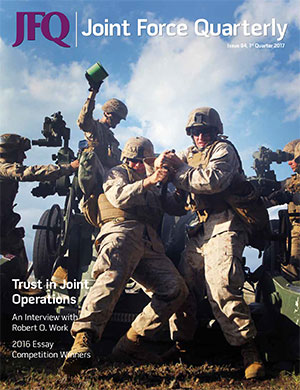
This issue of JFQ brings you the best new ideas from and for the Joint Force.
My interview with Deputy Secretary of Defense Robert Work leads off this issue’s Forum Section. Stanley Springer, John Schommer, and Sean Jones bring us an interesting piece on trust as the real glue that holds joint operations together. Continuing our efforts to bring new thinking on cyber issues, Scott Applegate, Christopher Carpenter, and David West recommend a way to adapt existing concepts from the real world of warfighting to the terrain of cyberspace. Returning to another popular discussion area in these pages, Kevin Ayers provides his take on how to best provide theater ballistic defense in the Asia-Pacific Region.
JFQ next presents the winning essays from the 10th annual Secretary of Defense and 35th annual Chairman of the Joint Chiefs of Staff Essay Competitions, held here at National Defense University (NDU). In May, 23 judges from 14 participating joint professional military education (JPME) institutions met to determine the best JPME student entries among the three categories. The Secretary of Defense National Security Essay winner, Major Lee M. Turcotte, USAF, reviews the history of the internment of Japanese-Americans during World War II. Winning the Chairman of the Joint Chiefs of Staff Strategic Research Paper competition, Lieutenant Colonel David A. Mueller, USMC, discusses the military’s responsibilities during operations to achieve post-conflict civil order and governance. Leveraging his personal experiences in Palestine, Lieutenant Colonel Jeffrey Dean McCoy, USA, won the Chairman’s Strategy Article competition by discussing options for the future of the Palestinian Security Force.
In JPME Today, two articles celebrate the 70th anniversary of the National War College (NWC). NWC Commandant Darren Hartford and Dean of Faculty David Tretler give us an insider’s view of an enduring institution here at NDU, with a very modern focus on educating the next generation of our most senior joint force, interagency, and international military leaders. Janet Breslin-Smith takes us back through National War College’s rich 70-year past. On PME itself, Joan Johnson-Freese and Kevin Kelley continue the discussion on how to gauge the value of today’s professional military education.
In Commentary, suggesting it is time for a reversal of the current relationship between Army and Air Force forces in combat, Price T. Bingham offers an important discussion on the future of integrated AirLand operations. Extending the discussion of center of gravity as an operational concept, Aaron P. Jackson takes us inside the thinking of our Australian partners as he details their Defence Force’s new approach. As the battle against ISIL continues, Michael Reilly has developed a different way to consider the value of center of gravity approaches to defeat these hybrid threats. And reviving an old form of commentary JFQ used in the past, Joseph Collins provides us with an extended review of three important current books on general officer leadership.
In Features, Dave Nystrom and Joseph Wojtecki, Jr., discuss the importance of how to communicate to gain trust in any effort to accelerate innovation. Regarding global health engagement, Tracey Koehlmoos, Linda Kimsey, David Bishai, and David Lane stress the importance of a systems approach to achieving healthcare success overseas. Wilson VornDick suggests using joint performance evaluations as a way to improve how the military judges its Servicemembers’ performance and potential.
Originally an extended book review, I asked my NDU teammate Christopher Lamb to develop this edition’s Recall article, which focuses on one of the lesser known but key leaders of our successes in World War II and the man for whom the fort where JFQ is produced was named, Lieutenant General Lesley J. McNair. In Joint Doctrine, the Joint Staff’s Director of Joint Force Development (DJ7), Kevin Scott, discusses a relatively new and important process for developing civilians in joint military organizations through mentoring. In addition, Michael Hutchens, William Dries, Jason Perdew, Vincent Bryant, and Kerry Moores introduce a new Joint Operational Concept, the Joint Concept for Access and Maneuver in the Global Commons. As always, we provide you with the latest Joint Doctrine Update.
One of the enduring aspects of the thinking of James Madison, widely acknowledged as the father of the Constitution and the Bill of Rights, was his view of the power of public opinion. Madison saw public opinion as best expressed by a knowledgeable and strong public through its elected representatives as the basis for effective government. In today’s Internet-empowered opinion world with an often anonymous “public,” which can include someone who is not a U.S. citizen or even a person, it is increasingly hard to know what the public thinks. In the military, there are few avenues for expression of thought that can reach its decisionmakers. JFQ will continue to offer a way for strong and knowledgeable people to express their very best ideas. I am looking forward to hearing from you. JFQ